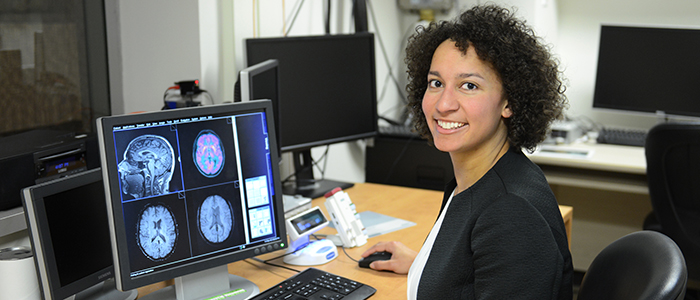Scanning the world for a passion project

Esther Warnert, PhD, isn’t the type of academic that is attracted by popular universities or famous laboratories.
Since she first began her education, the postdoctoral fellow’s aspiration has been to find interesting projects to work on that she is passionate about and genuinely enjoys.
It was this pursuit that brought Warnert to Schulich Medicine & Dentistry in January to begin her postdoctoral fellowship in the Department of Clinical Neurological Sciences.
Born and raised in a small town in the Netherlands, Warnert completed a bachelor’s degree in biomedical engineering and a master’s degree in medical engineering close to home in a city called Eindhoven. She completed her PhD training in Cardiff, Wales at the Cardiff University Brain Research Imaging Centre (CUBRIC).
When she was ready to look for a postdoctoral placement, the young researcher didn’t limit herself to Europe — she was open to travelling the world and experiencing what it would be like to live and work in a completely different environment.
“I basically just started looking for places that had projects that fit my qualities and had areas I could build on — the location didn’t matter as much to me,” Warnert said. “It was the project I would be working on and the equipment I would be working with here that really drew me in.”
With a wealth of knowledge on and experience with magnetic resonance imaging techniques, Warnert was intrigued about increasing her skill set by working with positron emission tomography (PET) imaging — a unique aspect of medical imaging in which Schulich Medicine & Dentistry researchers have become experts in.
Warnert’s postdoctoral research involves scanning patients to determine whether or not inflammation of the brain is related to disease progression in frontotemporal dementia.
“There is a recent hypothesis that patients with frontotemporal dementia have a sort of broken inflammatory process in their brains, or extra inflammation that causes the disease to progress,” she explained. “This pilot study will help us obtain more information about the disease and determine if this idea is correct.”
Frontotemporal dementia tends to affect patients at a younger age than Alzheimer’s disease, but also involves a progressive degeneration of brain cells that is irreversible. According to the Alzheimer Society of Canada, researchers estimate that approximately two to five per cent of all dementia cases are frontotemporal dementia.
“A lot of research on frontotemporal dementia is necessary, because we still really don’t know what’s going on in the brains of affected patients,” Warnert said, adding that she is looking forward to working with this specific patient group in such a translational study.
A natural athlete and food junkie, Warnert’s infectious personality and positive spirit have already helped her form meaningful connections in London. When she’s not busy working on her research or settling into her new office space, the postdoctoral fellow is playing volleyball, joining in on weekend dodgeball tournaments, and trying out restaurants in the city she now calls home.








